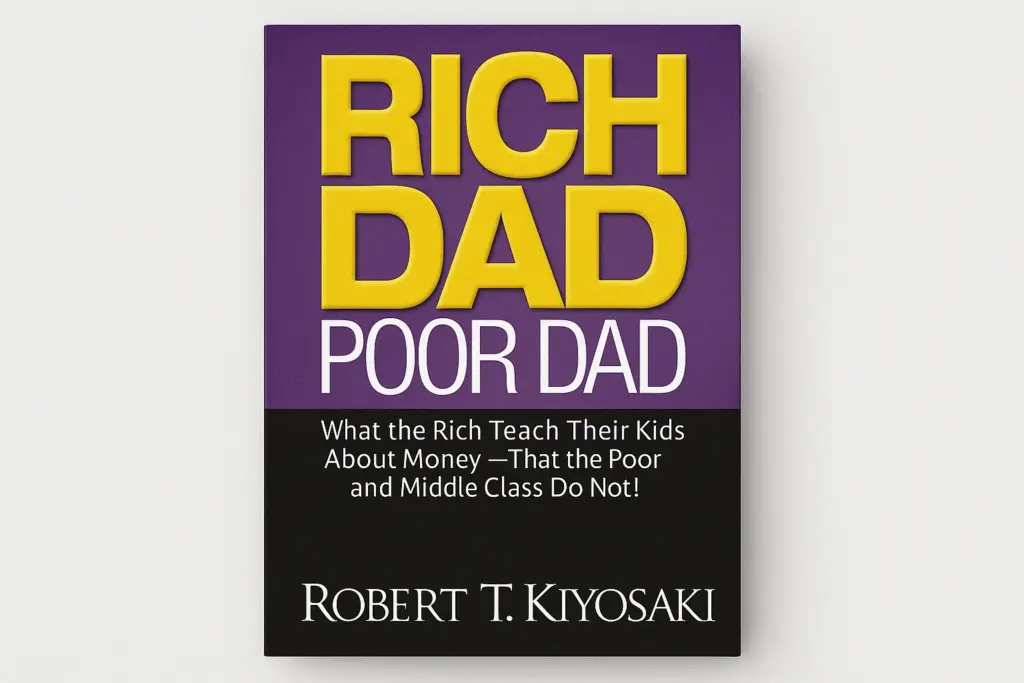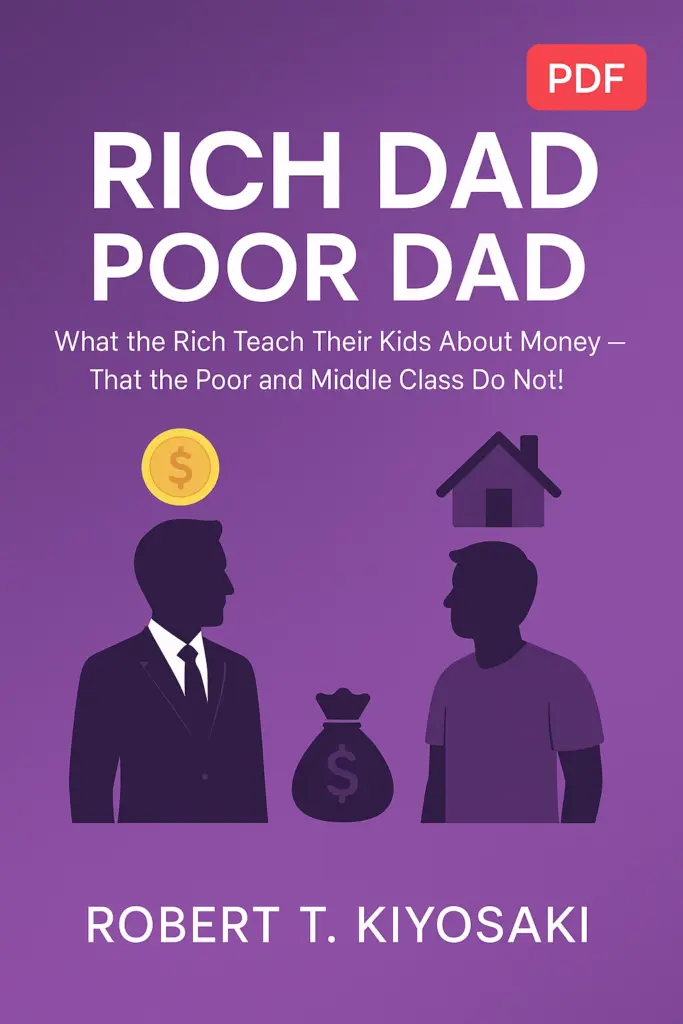
Okay, so… where do I even begin? I picked up Rich Dad Poor Dad by Robert T. Kiyosaki during one of those half-productive nights—emails open, half a coffee left, and tabs I don’t even remember opening. And yet… this book? Somehow managed to *stick*. Oddly simple, sometimes repetitive, and a little punchy. Still, there’s something about it.
The Premise – Two Dads, Two Money Mindsets
The book contrasts two very different philosophies:
- Rich Dad – The wealthy friend’s dad who builds assets and understands how money works.
- Poor Dad – The traditional, job-secure, well-educated figure who sticks to the rat race.

The entire narrative moves between these contrasting ideologies, showing how each shaped Kiyosaki’s financial thinking. And yes, while the storytelling is straightforward, it gets the point across. Especially if your brain’s half-focused—it’s like, “Wait, did I miss a bit?” but then you’re caught up
Behind the Hype – Why Rich Dad Poor Dad Keeps Trending
Every now and then a book shows up on like… every recommendation list ever. Rich Dad Poor Dad is one of those. You’d think it’d get outdated by now (I mean, it came out in the late ‘90s), but somehow it’s still relevant. Possibly because schools still don’t teach what a liability is unless it’s legal trouble .
The tone is casual, not textbook-ey. Like, you could be on a bus, or in a meeting pretending to take notes, and still pick up valuable takeaways. The repetition? Eh, it’s annoying but lowkey useful when your brain’s in five t
Real-World Lessons You’ll Probably Rethink
The book drops nuggets that, honestly, mess with how you see things. Like:
- Your home? Might not actually be an asset (ouch).
- Job security? Not the ultimate goal—financial freedom is.
- Working harder ≠ becoming richer (yep, let that sink in).
You start questioning your spending habits. That fancy gadget or car? Hmm. Is it helping build passive income or just flexing liabilities? One paragraph you’re inspired, the next yo
Inside the Rich Dad Poor Dad PDF – A Reader’s Takeaway Moments
Alright, so flipping through the Rich Dad Poor Dad PDF version on my tablet while half-dozing on a rainy Sunday… I had these tiny, punch-in-the-gut moments. Some of the stuff? Just sticks.
One chapter casually drops, “The rich don’t work for money.” And I just paused—like wait, what? Reread it twice. That line alone flipped a switch. You realize how deeply we’re conditioned to chase a paycheck, never questioning what else could exist outside of monthly wages.
Then there’s that breakdown of assets vs. liabilities. I always thought owning a car meant I was progressing. But nope. The way it’s explained? Anything that takes money out of your pocket consistently is a liability. Oof. That section hit hard. Especially when the examples are laid out super simply—like even a distracted brain can follow.
The Rich Dad Poor Dad PDF also throws in little jabs about fear, especially how most people avoid risk so much they stay stuck in the same cycle forever. That part had me looking at my savings account like… yeah, that’s not really doing much for me, is it?
Honestly, even when you’re reading it in bits—like a few pages between emails or while waiting for something—the insights still sneak up on you. It’s not preachy. Just blunt. Direct. And kind of unsettling in the best way possible.
Table of Key Concepts
| Concept | Description | Real-Life Impact |
|---|---|---|
| Assets vs. Liabilities | Buy things that earn, not consume. | Rethink what you call an “investment”. |
| Work to Learn, Not Just Earn | Diversify skills—sales, marketing, investing. | Become irreplaceable, not just employed. |
| Mindset Matters | Rich people think differently—literally. | Switch from “I can’t” to “How can I?” |
| Financial Education | School doesn’t teach money; life does. | Learn by doing, failing, and adjusting. |
Did It Drag? A Little, Maybe
Look, there are times when you’re like, “Didn’t he already say that?” Yes, yes he did. Probably thrice. But maybe we need it. With a distracted mind (me), it actually helps drive it home. Still, you might skim a few paragraphs without missing anything earth-shattering.
Pros and Cons
The Good Stuff
- Super easy to understand—even if you’re juggling laundry and emails.
- Big mindset shifts packed into everyday stories.
- Motivational, without being guru-style preachy.
A Few Gripes
- Could’ve been half as long and just as powerful.
- No detailed step-by-step financial tactics (don’t expect formulas).
- Some ideas feel oversimplified or even debatable.
Who Should Read It?
If you’re someone who:
- Thinks about escaping the 9-to-5 but doesn’t know where to start
- Wants a mindset reboot on wealth creation
- Feels confused about assets, liabilities, and investing
Final Thoughts – Is It Worth Your Time?
Even when you’re not 100% tuned in—like, hello, multitasking life—Rich Dad Poor Dad manages to punch through the noise. It’s part motivation, part financial awakening. Not a manual, more like a map… sketched in crayon, but still helpful.
Is it flawless? Nope. But is it eye-opening in its own weirdly simple way? Yes. Honestly, you’ll probably never look at “buying a car” the same again. And that alone makes it worth flipping through, eve
FAQs About Rich Dad Poor Dad
| Question | Answer |
|---|---|
| Is it just theory or practical? | More mindset than step-by-step. It opens the door, but doesn’t walk you through it. |
| Is this only for entrepreneurs? | Nope. Anyone confused about money (hi, most of us) can benefit. |
| Will I learn investing? | Sort of. It’s not a guide, but you’ll think differently about money and risk. |
It’s less “how to make millions” and more “how to start thinking like someone who could.” Big difference, but powerful.
